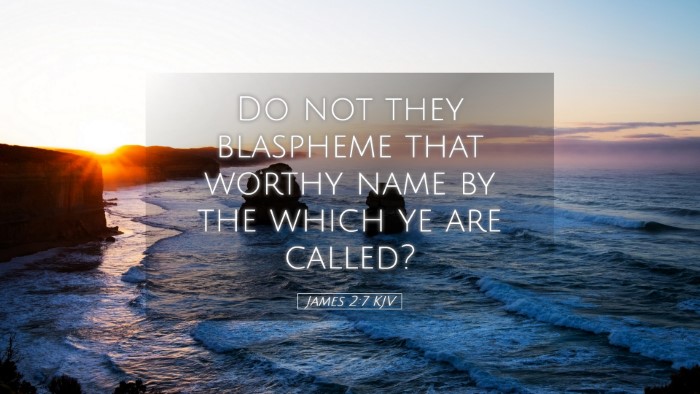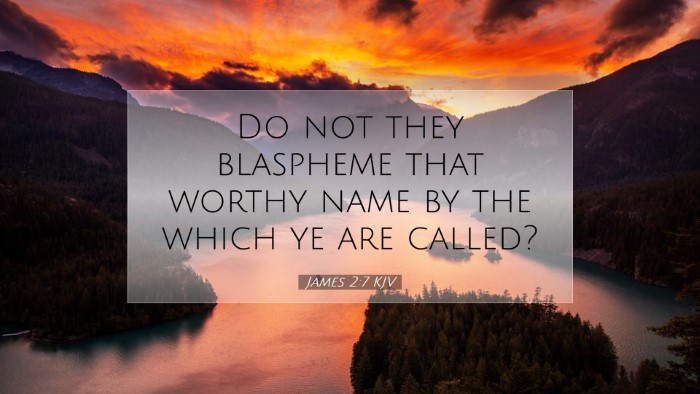Old Testament
Genesis Exodus Leviticus Numbers Deuteronomy Joshua Judges Ruth 1 Samuel 2 Samuel 1 Kings 2 Kings 1 Chronicles 2 Chronicles Ezra Nehemiah Esther Job Psalms Proverbs Ecclesiastes Song of Solomon Isaiah Jeremiah Lamentations Ezekiel Daniel Hosea Joel Amos Obadiah Jonah Micah Nahum Habakkuk Zephaniah Haggai Zechariah MalachiJames 2:7
James 2:7 KJV
Do not they blaspheme that worthy name by the which ye are called?
James 2:7 Bible Commentary
Commentary on James 2:7
James 2:7 reads: "Do not they blaspheme that worthy name by the which ye are called?" This verse speaks volumes about the importance of the name of Jesus in Christian identity, faith, and practice. The Apostle James, in his epistle, addresses the issues of favoritism and discrimination within the church, highlighting how such behaviors contradict the very essence of Christian faith.
Contextual Overview
In the preceding verses, James admonishes believers against showing partiality towards the rich while neglecting the poor. His rhetorical questions in verse 7 serve as a reminder that by favoring the wealthy, believers not only commit a sin but also dishonor the name of Christ—an act tantamount to blasphemy.
Insights from Matthew Henry
Matthew Henry emphasizes the gravity of the name by which believers are called. He notes that being called by Christ's name signifies a relationship that demands respect and honor. Henry states that to blaspheme this name is to show disrespect to the very entity that provides salvation and identity to the believer. He argues that favoritism not only discredits one's faith but also misrepresents the nature of God, who shows no partiality.
Insights from Albert Barnes
Albert Barnes, in his commentary, expands on the notion of blasphemy. He suggests that the practice of favoritism essentially speaks against the character of God, who is impartial and just. He writes, "In this respect, they are acting as if they denied the Lord who bought them." Barnes challenges pastors and theologians to consider the implications of their actions and the integrity of their witness. The name of Jesus represents the standard of love and equity, which must be upheld by the church.
Insights from Adam Clarke
Adam Clarke provides a deep theological reflection on the implications of this verse. He connects the idea of blasphemy to the moral responsibilities of believers. Clarke states that the act of showing partiality is a direct violation of the law of love, which is foundational to Christian doctrine. He highlights that a believer’s actions reflect on the larger body of Christ; thus, failing to honor the least among them tarnishes the name they bear.
Theological Implications
- Identity in Christ: The verse underscores the identity that believers possess as those called by the name of Jesus. This identity demands a lifestyle that reflects His values.
- Moral Accountability: Believers have a responsibility not only to uphold their faith but also to ensure their actions do not bring dishonor to the name they profess.
- Community Ethics: The Christian community is called to create an environment of love and acceptance, where favoritism and discrimination are not tolerated.
Application for Pastors and Leaders
For pastors and church leaders, the admonition against favoritism serves as a crucial reminder to lead by example. The call to engage equally with all members of the congregation—regardless of socio-economic status—reinforces the Christian message of inclusivity and love. Leaders should strive to cultivate a community that reflects the views of Christ on dignity and worth.
Conclusion
James 2:7 serves as a profound reminder of the weight of the name we bear as Christians. It invites introspection regarding our conduct and its alignment with the teachings of Christ. The insights from Matthew Henry, Albert Barnes, and Adam Clarke collectively urge an examination of personal and communal ethics within the church. As scholars and theologians reflect upon this text, they are led to consider how their understanding and application of the message can enhance both personal faith and community practice.


